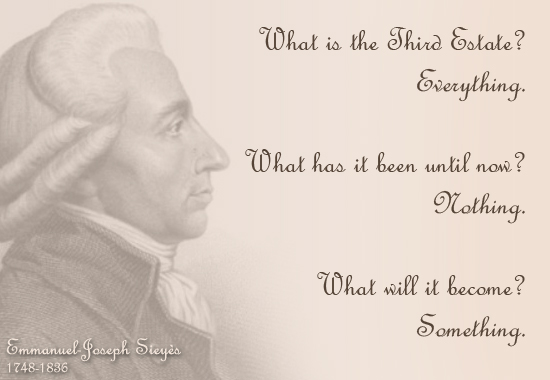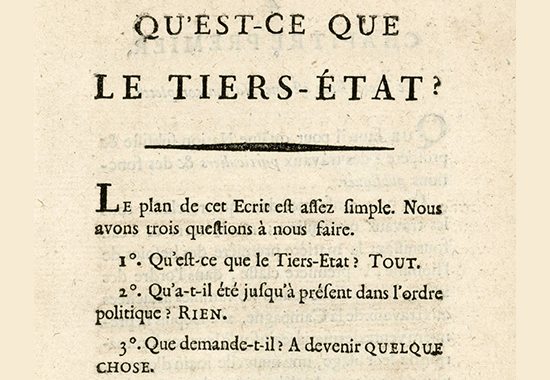|



 Explorers, Scientists &
Inventors
Explorers, Scientists &
Inventors
 Musicians, Painters &
Artists
Musicians, Painters &
Artists
 Poets, Writers &
Philosophers
Poets, Writers &
Philosophers
 Native Americans & The Wild
West
Native Americans & The Wild
West
 First Ladies
First Ladies
 Popes
Popes
 Troublemakers
Troublemakers
 Historians
Historians
 Archaeologists
Archaeologists
 Royal
Families
Royal
Families
 Tribes & Peoples
Tribes & Peoples
Assassinations in History
Who
got slain, almost slain, when, how,
why, and by whom?
 Go to the
Assassination Archive
Go to the
Assassination Archive

Online History Dictionary A - Z



Voyages in History
When did what
vessel arrive with whom onboard and where
did it sink if it didn't?
 Go to the
Passage-Chart
Go to the
Passage-Chart


The Divine Almanac
Who all roamed the heavens in
olden times? The Who's Who of
ancient gods.
 Check out
the Divine Almanac
Check out
the Divine Almanac

|
|

January 1789 —
In his pamphlet What Is the Third Estate?
Sieyès argues that the Third Estate is, in fact, the French
people.
What Is the Third Estate? 1789
In January 1789,
 Emmanuel-Joseph Sieyès wrote his pamphlet
Emmanuel-Joseph Sieyès wrote his pamphlet
Qu'est-ce que le tiers état?
(What Is the
Third Estate?)
Go here for
 the French original.
the French original.
Here is an excerpt translated into
English:
|
|
What is necessary
that a nation should subsist and prosper?
Individual effort and public functions.
[Individual Efforts]
All individual efforts may be included in four
classes:
(1) Since the earth and the waters
furnish crude products for the needs of man, the
first class, in logical sequence, will be that
of all families which devote themselves to
agricultural labor.
(2) Between the first sale
of products and their consumption or use, a new
manipulation, more of less repeated, adds to
these products a second value more or less
composite. In this manner human industry
succeeds in perfecting the gifts of nature, and
the crude product increases twofold, tenfold,
one hundred-fold in value. Such are the efforts
of the second class.
(3) Between production and
consumption, as well as between the various
stages of production, a group of intermediary
agents establish themselves, useful both to
producers and consumers; these are the merchants
and brokers: the brokers who, comparing
incessantly the demands of time and place,
speculate upon the profit of retention and
transportation; merchants who are charged with
distribution, in the last analysis, either at
wholesale or at retail. This species of utility
characterizes the third class.
(4) Outside of
these three classes of productive and useful
citizens, who are occupied with real objects of
consumption and use, there is also need in a
society of a series of efforts and pains, whose
objects are directly useful or agreeable to the
individual. This fourth class embraces all those
who stand between the most distinguished and
liberal professions and the less esteemed
services of domestics.
|
Such are the efforts which sustain society. Who
puts them forth? The Third Estate.
[Public Functions]
Public functions may be classified equally well,
in the present state of affairs, under four
recognized heads: the sword, the robe, the
church, and the administration. It would be
superfluous to take them up one by one, for the
purpose of showing that everywhere the Third
Estate attends to nineteen-twentieths of them,
with this distinction; that it is laden with all
that which is really painful, with all the
burdens which the privileged classes refuse to
carry. Do we give the Third Estate credit for
this? That this might come about, it would be
necessary that the Third Estate should refuse to
fill these places, or that it should be less
ready to exercise their functions. The facts are
well known. Meanwhile they have dared to impose
a prohibition upon the order of the Third
Estate. They have said to it: "Whatever may be
your services, whatever may be your abilities,
you shall go thus far; you may not pass beyond!"
Certain rare exceptions, properly regarded, are
but a mockery, and the terms which are indulged
in on such occasions, one insult the more.
If this exclusion is a social crime against the
Third Estate; if it is a veritable act of
hostility, could it perhaps be said that it is
useful to the public weal? Alas! who is ignorant
of the effects of monopoly? If it discourages
those whom it rejects, is it not well known that
it tends to render less able those whom it
favors? It is not understood that every
employment from which free competition is
removed, becomes dearer and less effective?
In setting aside any function whatsoever to
serve as an appanage for a distinct class among
citizens, is it not to be observed that it is no
longer the man alone who does the work that it
is necessary to reward, but all the unemployed
members of that same caste, and also the entire
families of those who are employed as well as
those who are not? Is it not to be remarked that
since the government has become the patrimony of
a particular class, it has been distended beyond
all measure; places have been created, not on
account of the necessities of the governed, but
in the interests of the governing, etc., etc.?
Has not attention been called to the fact that
this order of things, which is basely and—I even
presume to say—beastly respectable with us, when
we find it in reading the History of Ancient
Egypt or the accounts of Voyages to the Indies,
is despicable, monstrous, destructive of all
industry, the enemy of social progress; above
all degrading to the human race in general, and
particularly intolerable to Europeans, etc.,
etc.? But I must leave these considerations,
which, if they increase the importance of the
subject and throw light upon it, perhaps, along
with the new light, slacken our progress.
It suffices here to have made it clear that the
pretended utility of a privileged order for the public service is
nothing more than a chimera; that with it all that which is
burdensome in this service is performed by the Third Estate; that
without it the superior places would be infinitely better filled;
that they naturally ought to be the lot and the recompense of
ability and recognized services, and that if privileged persons have
come to usurp all the lucrative and honorable posts, it is a hateful
injustice to the rank and file of citizens and at the same time a
treason to the public.
Who then shall dare to say that the Third Estate
has not within itself all that is necessary for
the formation of a complete nation? It is the
strong and robust man who has one arm still
shackled. If the privileged order should be
abolished, the nation would be nothing less, but
something more. Therefore, what is the Third
Estate? Everything; but an everything shackled
and oppressed. What would it be without the
privileged order? Everything, but an everything
free and flourishing. Nothing can succeed
without it, everything would be infinitely
better without the others.
It is not sufficient to show that privileged
persons, far from being useful to the nation,
cannot but enfeeble and injure it; it is
necessary to prove further that the noble order
does not enter at all into the social
organization; that it may indeed be a burden
upon the nation, but that it cannot of itself
constitute a nation.
In the first place, it is not possible in the
number of all the elementary parts of a nation
to find a place for the caste of nobles. I know
that there are individuals in great number whom
infirmities, incapacity, incurable laziness, or
the weight of bad habits render strangers to the
labors of society. The exception and the abuse
are everywhere found beside the rule. But it
will be admitted that the less there are of
these abuses, the better it will be for the
State. The worst possible arrangement of all
would be where not alone isolated individuals,
but a whole class of citizens should take pride
in remaining motionless in the midst of the
general movement, and should consume the best
part of the product without bearing any part in
its production. Such a class is surely estranged
to the nation by its indolence.
The noble order is not less estranged from the
generality of us by its civil and political
prerogatives.
What is a nation? A body of associates, living
under a common law, and represented by the same
legislature, etc.
It is not evident that the noble order has
privileges and expenditures which it dares to
call its rights, but which are apart from the
rights of the great body of citizens? It departs
there from the common order, from the common
law. So its civil rights make of it an isolated
people in the midst of the great nation. This is
truly imperium in imperia.
In regard to its political rights, these also it
exercises apart. It has its special
representatives, which are not charged with
securing the interests of the people. The body
of its deputies sit apart; and when it is
assembled in the same hall with the deputies of
simple citizens, it is none the less true that
its representation is essentially distinct and
separate: it is a stranger to the nation, in the
first place, by its origin, since its commission
is not derived from the people; then by its
object, which consists of defending not the
general, but the particular interest.
The Third Estate embraces then all that which
belongs to the nation; and all that which is not
the Third Estate, cannot be regarded as being of
the nation.
What is the Third Estate?
It is the
whole.
From: Modern
History Sourcebook (Fordham) and Roy Rosenzweig Center who in turn
draws from
Merrick Whitcomb, ed., Translations and
Reprints from the Original Sources of European
History, vol. 6 (Philadelphia: University of
Pennsylvania History Department, 1899), 32–35.

More History
|